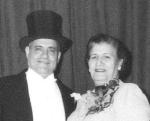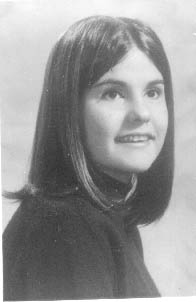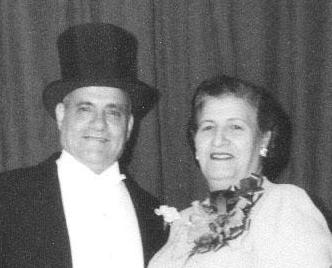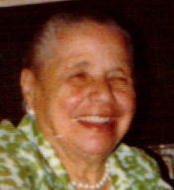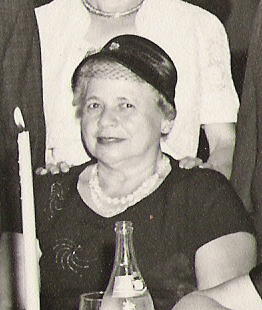| Ethnography Report:
A Biographical Study of the Culture of the Sephardim
Adele Baruch
Pd. 3
I. Introduction
The subculture which I have studied is the one of the Sephardic Jews.
One community which is a stronghold of this culture in America is in a group
of apartment houses in Far Rockaway.
The people of this community have been together for approximately 80
years. They originally came from small towns a was then part of Turkey.
One town, from which many of the people have come is Monastir. This town
is now part of Yugoslavia. Others had moved out of Monastir, in search of
work to the factory town of Cavala. These towns are across the mountains
from each other. Cavala is, today, part of Greece.
The men of these towns were forced to leave, in order to escape the draft.
When the Balkan wars broke out, they came to America. Because they always
married within their group, the women soon followed. They came to the East
Side of New Work; and they married and lived there for about 12 to 15 years.
When their families became a little larger, they all moved to the "suburbs"
of New Lots, in Brooklyn.. They remained there for about 40 years, until
all of their children had married and moved away. The next place that they
moved to, is the group of apartments in Far Rockaway.
Through my questionnaire, I have attempted to discover what this culture
was like in Europe, and how it evolved to be what it is today. I have tried
to get an accurate picture of what day to day life was like in Monastir,
and what it was like to move to a new country.
There were various problems that I ran into with my interviews. The people
that I questioned were all around 80 years old. None of them know their
exact age - they range from sometime before or after "the 'fire ".
I interviewed my two grandmothers, Grandma C. and Grandma B., both from
Monastir, a woman from Cavala, Beckey, and her husband from Monastir, Isaac.
Aside from an age barrier (perhaps experience barrier would be a better
description), there was a language barrier. Because they all lived so close
to each other and dealt almost exclusively with people of their own group,
there was never any real need to learn English. And though they know enough
of the language to communicate with me, there were many expressions and
phrases they had difficulty in getting across to me.
Understandably, many of their recollections of early childhood weren't
very clear. However, they do remember some anecdotes in surprising detail.
Some of the questions that I asked them were questions that they couldn't
understand. My grandmother could not understand it when I asked her if she
liked her husband when she first met him. In fact, she was a little shocked.
It was a little hard to follow the question format. Grandma C. was very
funny. She sat down (a little uncomfortably) and said "I don't know
where to start." I asked her the first question, and she went on, without
stopping, story by story, about her life, until the birth of her first child.
Not only did she tell the stories from her point of view, but from several
other's also.
One unfortunate thing though, was that they all stopped their stories
at the birth of their first child. It was hard to get them to express any
general changes in their lives over the past 50 years. Perhaps my questioning
in this area was too general. I had to draw conclusions about change from
the drastic differences of the children of my generation from that culture.
Also, especially with the men, these people are used to story telling. They
expect you to sit and listen, and they became insulted when I began writing.
They kept on saying: "Don't write, listen." So I had to piece
together information from little phrases or words that I was able to jot
down between stories.
They were basically very honest and cooperative. They told, of course
many of the tried and trusted stories of their childhood which they have
told many times over the years. But in such previously undiscussed areas
such as fear of a new country and childhood games they were very honest
and helpful in remembering.
The Questionnaire
1. Can you briefly describe the places where you lived?
2. Did you live with your family as a child?
3. Can you describe you home in Europe?
4. What are some of your early recollections of your firs+ friends?
5. How many bothers and sisters did you have? Which ones were you closest
with ?
6. Which people were most important in teaching and giving you advice
as a child?
7. Was your upbringing strict or relatively free?
8. What kind of games did you play as a child?
9. In what ways was discipline enforced for you?
10. How did you receive training for your occupation?
11. Did you attend a public school? A Hebrew school?
12. What role did religion play in you life as a child?
13. When did you begin your first job?
14. Can you describe your first job and some of the people that you
worked with.
15. How old were you when you came to the U.S.?
16. Did you come with any relatives?
17. Why did you come?
18. What was your first reaction to the U.S.
20. Who did you first stay with here?
21. During your first years here, did you stay in a community of Sephardic
Jews?
22. How was your husband (or wife) chosen?
23. Can you describe your wedding?
24. Can you describe the community that you lived in during your first
years of marriage?
25. Can you describe some changes in the Sephardic community that have
taken place over the years? Have many traditions remained? Can you give
some examples of change?
II. The Sephardic Culture.
The Turks of the Ottoman Empire, as I have mentioned, were relatively
tolerant. As a result some of the Jews there became very prosperous. Part
of Monastir was inhabited by these very rich Jews, However, this particular
group that I have studied came from the poorer section of town. The people
of the poorer section were generally the servants for the wealthier people.
Some had small businesses such as a vegetable stand.
The three people who lived in Monastir said they lived comfortably. The
houses were usually shared by two relatives (two sisters, for instance)';
and they had two doorways, one for each family. Outside of the doorways
ware two large stones on which the people used to sit and talk. (This custom
of sitting and talking outside was carried all the way to New Lots. Each
house there had a bench in front of it.)
Each family, generally, had two large rooms. One room had a large stove
(coal-burning), which they used to cook with, heat the house with, and heat
the water with. There was no furniture, except some of the - wealthier homes
had mats and pillows on which to sit. The children slept in the large room
with the stove at night. Isaac slept in a room with 11 other children; and
they used to sleep in line according to age. The parents slept in the other
room, usually with the youngest child. These people all had wells inside
of their houses so they were at least comparatively comfortable. Most of
the people in their neighborhood had to go to the center of town to get
water
Most of the girls had no formal education. They were trained daily by
their mothers in doing housework, cleaning sewing, and in how to keep a
Kosher home. Grandma B. was going to be sent to a Greek school that was
in the area. However, her mother learned that this was a strongly Catholic
school, and gave up the idea of an education for her daughter. Isaac went
to school at the Aliance Israelitz Universal. I got the impression that
this was a French Hebrew school which was started to spread the French language.
The French seemed to have built many similar schools throughout Europe.
He was taught Hebrew, Spanish) Greek, and mostly French.
From what I gather, this school was looked down upon by the very orthodox
people of the neighborhood. They sent their children away to a school which
only spoke Hebrew.
Most of the young girls were sent out of the house to live and work in
the homes of the wealthier people. One grandmother was five when she left
her family's home; the other was 13. They took care of the children and
did some general housekeeping- attaining more responsibilities as they got
older. The places where they w5ked were never more than a few blocks from
home. A brother or relative was always dropping by to say hello or to pick
the girl up for dinner at home.
Isaac left school at the age of 15 to go to work. He worked in several
neighborhood retail stores. From what I gathered, most of the men went out
to work at about that age.
Some of the games that the girls played were hide and seek and cards.
They also used to sing and dance in a circle, either to the accompaniment
of a tambourine or some instruments made from tin cans. The boys used to
play team games. One game would involve one team sitting around in a circle
with one person guarding them. The other team would try to hit one person
on the sitting team with a small ball that was on the end of a string.
Beckey lived in the small port town of Cavala. All of the Sephardic Jews
there worked in the tobacco factory there. This town was like Monastir.
Beckey's friends and relatives all lived in the poorer part of a wealthy
Jewish town. However, because Becky (now 75) was a few years younger than
the others, she was affected by the terrible bombings of the Balkan Wars.
Consequently, she spent many of the nights of her childhood hiding in a
cemetery, away from the bombings. Living was much less comfortable because
of the unavailablity of supplies and food. Beckey, like most of her friends,
worked cleaning up after the men in the factory.
The children didn't have time, really, for much play, in a poor area
of a war torn country. But she does remember spending some afternoons by
the docks with her friends. They used to play, jumping from boat to boat.
In both these towns, these people's lives were very influenced by religious
tradition. Their small Sephardic Temple was open all day- with people constantly
praying in it. They would wash their hands and pray before and after each
meal. Whenever hard luck hit a household, a child or a parent would go to
the temple and pour some oil and give some money to charity.
I really didn't get a clear picture of the way discipline was enforced.
They all said that, as children, they never disobeyed their parents. Grandma
C. does remember one time when her mother voiced disapproval of her appearance.
As a girl of fifteen, she curled her hair high, and tied the ends in a ribbon-in
the latest fashion of that time. Her mother did not reprimand her or order
her to change her hair, but rather, just stated that the girl was being
silly and that she looked prettier with her hair plain.
In 1808, with the takeover of the Turkish government by Sultan Hamid,
the Turks changed their laws concerning Jews. They were no longer restricted
from military service. With the coming of the Balkan Wars, the men of this
group all fled the country to America. To marry outside of your community
was unthinkable, and soon letters and money was being sent across the ocean
for the women.
During the trip over, none of them recalled having a particularly difficult
time. One exception might be the emotional state of Grandma
C. Before sailing, she had gone to the port town of Solonik-where the boats
to America were docked. She was with her future sister-in-law and her father.
At this town, she met a former employee, who considered her to be almost
a daughter. He had heard that the man that she was going to America to marry
was a compulsive gambler. He begged her not to go to America so she would
not have to marry this man.
However the promise had been made, and she could not return home to her
mother who was having some economic troubles as it was. So she came to America
with such dread in her heart that she was sick all the way across the ocean.
(The rumors that were reported about the man who was to be my grandfather
had gotten distorted when they crossed the ocean; the warnings were sent
about another man)
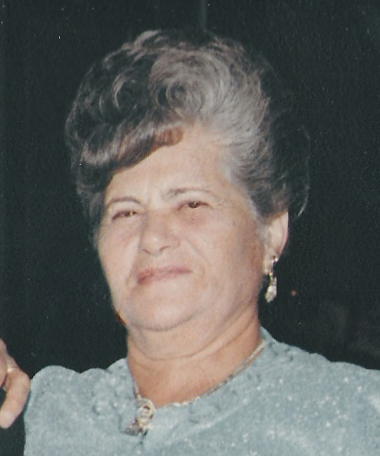 Becky Baruch
Becky Baruch
Beckey, who came several years later, had gotten news that she had to
learn a language before coming to Ellis Island, or they wouldn't let her
in. So she invested 20 dollars and took cram courses in Hebrew before coming
over.
When they came to America they all went to live on or around Henr.2y
Street on the East Side of New York. Both Beckey and Isaac (coming without
previous marriage arrangements) went to work within three days of their
arrival. Isaac worked in a tin can factory and Beckey worked in a piece
goods place. Both Grandmothers began carrying out their marriage plans from
the moment they got here.
Marriage was done either by a matchmaker, the relative that brought the
child over, or through letters between relatives in Europe and the men in
America. Marriages were often arranged between cousins or within families
(For instance, a girl would marry a boy, and his sister would marry his
wife's brother.) Grandma C. was explaining the disadvantages of this system.
"If you were having a problem with a person, there was never anyone
to tell it to. Everyone was everyone else's relative."
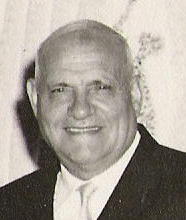 Avrahm Cassorla, circa 1962
Avrahm Cassorla, circa 1962
My Grandpa C. thought that he would be an exception, He attempted to
plan his own marriage. His father died in Europe unexpectedly. He wrote
to his mother that, though he had been planning to return home to marry
in front of his father's eyes, since that became impossible, he had changed
his plans. He told his mother about a girl he had met in America who he
planned to marry.
However, knowing this girl's relatives, his mother objected to this match.
She was best friends with Grandma C's mother; and she thought Grandma C.
to bean appropriate match for her son. She sent a letter to her son telling
him to forget about the woman he was planning to marry- and that she was
currently sending him a wife from Europe.
Grandma B. was sent over to America, also with instructions from her
parents on the man she was to marry. However, unlike the situation with
Grandpa C. (who consented to marry my grandmother the moment he saw her)
Grandpa B. decided he did not want to marry my Grandmother when he met her
at the boat. However, the uncle which brought my Grandmother over took him
for a walk on the bridge and convinced him that he had to marry her.
The best picture that I got of the Sephardic customs in the engagement-courtship-wedding...honeymoon(?)
procedure was through the stories of Beckey and Isaac.
Their marriage was arranged by a relative-matchmaker. Beckey did not
want to get married., but her brother, with whom she was living at the time,
felt that she was ready. Arrangements were made so that the two could meet.
Isaac and his brother and Beckey and her family were invited over a mutual
relatives house. It was not the custom with them to introduce people then,
so after the brief visit which consisted of a short conversation and the
passing around of some sweet jelly, Beckey still was not sure who her perspective
husband was.
However, Isaac remembered her. He called for her unexpectedly
the next Friday night. Because he was unexpected, and all the tenants knew
this (because everyone always knew everyone else's expected guests) her
neighbors felt they should warn Beckey's family. So they put to work their
warning system that they had devised. They opened up their doors and the
person on the first floor coughed and said the name Isaac-the person on
the second floor did the same, until the message reached Beckey on the sixth
floor.
However, Beckey was not too happy, to receive her guest. She had just
washed her hair and put it in pigtails; and she had gotten into a housedress.
She immediately ran into the back room and locked the door and refused to
come out. When Isaac came to the door, her sister-in-law pleaded with Beckey
to come out. She refused. Her brother ordered her to come out after Isaac
had come in, Beckey had no choice.
So she sat in a corner, and spoke only when spoken to. But to her surprise,
when she walked Isaac to the door, he asked her to go to Coney Island with
him the next day.
A 15 month courting period followed. Beckey recalls how, after they had
been going out for a while, they faced the problem of trying to kiss each
other good night in private. All of the neighbors had windows at the tops
of the doors that they could look through. When they knew the two young
people were coming home, everyone would watch over their doors. Beckey told
me that she had recently met a woman who recognized them and said: "Oh,
I remember you. I used to watch you come to the top of the stairs and kiss
each other good night all the time.
The wedding was not fancy, but it certainly was large. Everyone in the
whole neighborhood was invited. Beckey recalls that all the people who usually
ate all the danishes were the strangers who had come in, because your friends
were usually too polite to eat.
They had no honeymoon. On the day after the wedding, the bride would
get up and scrub the floors and prepare for the people who were coming to
celebrate again that day. In the morning, as was the custom, Beckey's sister
went into the bride's room to check for a blood stain on the sheets to insure
that the woman had been a virgin. If everything was alright, they would
immediately call guests in and celebrate with some sweets.
Almost all of the women became pregnant right after marriage. The neighboring
woman would help in the delivery, none of them went to the hospital. Often
this caused a lot of difficulty, especially when the woman had a problem
with childbirth. Beckey was in labor for three days. When she finally did
give birth to a baby, she was already dead.
The occupations after marriage varied. Many women, like my two grandmothers
and Beckey, stayed at home and took care of the children. They also took
care of the housework and the children of the women who were forced to go
out to work.
Grandma B. had a special job. She has the position of the Havra Kadusha.
This is a great honor in the Sephardic community and the position was handed
down to her from her grandmother. She arranges for all the religous and
ceremonial tasks which have to be done after death.She makes sure that the
family has visitors and meals; and she prepares the body for burial. Though
she cannot read or write, she also manages to take care of the financial
affairs involved.
Isaac went from the tin can business into the skirt manufacturing business
in with a couple of friends. None of them knew anything about
skirts, and they almost went bankrupt until one particular mill began giving
them a lot of business. He stayed in that field until his retirement at
65.
III. Conclusion
As I previously mentioned, these stories all pretty much ended with the
birth of the first child. However, it is easy to note some changes within
their culture. It was too hard for the men in America, who were struggling
for survival, to attend synagogue once a day, as most did in Europe. They
did go at least once a week. The religious customs have altered slightly,
but not as much as one would expect within the American culture.
Sometimes, when their children take part in a religious custom, such
as a holiday meal-the custom is abbreviated. Again, my grandmothers see
to it that traditions are not changed too much.
The modern devises, such as T.V. have come into their life, and have
also changed them a bit. As my Grandma B. said: "You know, when I see
everyone (meaning the children) do something, I want to do it too."
The children of these people have become modernized. They have moved
out to more expensive homes and complicated lives. They were given a public
education and they spoke both English and Spanish as children. They chose
their own marriage partner, usually someone within the Sephardic community.
My generation, with the parents moving outside of the Sephardic community
when they were young marrieds, is just barely familiar with the Sephardic
customs. Most of what we know is merely from stories told to us by our grandparents.
For us, the traditions which used to bind the Sephardic Culture together
have all but disappeared. | 